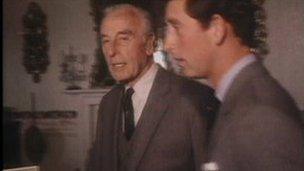Into the West - rural Ireland awaits the Queen's visit
- Published

Prince Charles described Lord Mountbatten as his favourite uncle
On the blustery shoreline at Rosses Point in County Sligo, the rotting wreck of an old wooden fishing boat is symbolic of the harsh financial realities facing the people in the Irish Republic at this time.
A little further along the shore line, bobbing in the windswept waters of Sligo Bay are the fibreglass pleasure craft of those who are weathering the bitter economic climate better than most.
In the midst of all this gloom - a visit from the Queen, the first since Ireland gained independence.
The country's connections with the crown are historic, numerous, controversial and bloody.
A few miles along the Sligo coast stands Classiebawn Castle, the former holiday home of Lord Mountbatten.
He was killed in 1979 when his fishing boat was blown up by the IRA after setting out to sea from nearby Mullaghmore harbour.
His murder was viewed as blow to the British establishment and a direct strike against the Royal Family itself.
Mayor of Sligo Matt Lyons said the local tourist industry is still recovering from that event.
'Great boost'
"Mullaghmore attracted a lot of English people prior to Lord Mountbatten's murder. It took years and years for that to recover and it hasn't really recovered," he added.
"Now the Queen is coming to the Republic and that's going to be a great boost for the country."
Councillor Lyons recognises that there will be those opposed to the visit.
"I know that some people don't agree with it but the reality is that whether we like it or not, people are fascinated with the Royal Family and the visit will attract large numbers of people to the Republic," he said.
"The benefit to tourism and the TV exposure you just couldn't buy."
In a bold move instigated by a Sligo Presbyterian minister, the Queen was invited to the county. The aim, to help heal old wounds and to bring Catholics and Protestants closer.
The invitation was eventually and politely turned down by Buckingham Palace but the clergyman behind it, the Rev Alan Mitchell says this isn't the end of the story.
"We may not have the Queen visiting the border counties this time but we know that Prince Charles is very keen to visit this part of the world," he said.
"And if the Queen's visit is successful and I'm sure it will be, then it'll open the door to other high profile visits in the future.
"We've been assured by the British Embassy and the Department of Foreign Affairs that County Sligo will be very high on the list."
Winds of change
So are the winds of change blowing through the north west coast of Ireland or will the protestors prevail?
Sean McEniff of the Fianna Fail party has been a councillor in Bundoran in County Donegal for over fifty years.
"You always have that sort of thing in any town, the noisy minority as I would call them, that go around spraying and painting walls, but that wouldn't represent the people of Bundoran" said Councillor McEniff.
While welcoming the fact that the Queen is coming to the Republic, the state visit has also surprised the veteran politician.
"I never even thought in my wildest dreams that it would ever happen" he said.
Donegal has a strong republican tradition but on the surface at least the Queen's visit is not causing that many waves.
Ground-breaking
Michael Daly who is Editor-in-Chief of the Donegal Democrat says it is not really a subject for public discussion.
"The people in general are very unwilling to come out publicly and say what their view is," he said.
"But the sense I get from many of them is that while they may not be out waving union jacks, the Queen is coming here and maybe she should have been here long before this.
"I don't see huge numbers of people in Donegal, which has a very republican tradition, getting hugely animated about it apart from the interest groups."
There is a view that the Queen's state visit to Ireland will lay another foundation stone in constructing a new and better future for all traditions in Ireland.
Reverend Mitchell agreed.
He said this ground breaking event was equally important to people on both sides of the border.
"We're living in a new day," he said.
"It's about prosperity, good relations, working together, integrating people, recognising people's right to be different and joining hands to build a great future for the island of Ireland."